Roxie Hart

Brief Synopsis
Cast & Crew
William A. Wellman
Ginger Rogers
Adolphe Menjou
George Montgomery
Lynne Overman
Nigel Bruce
Film Details
Technical Specs

Synopsis
In 1942, Chicago reporters Homer Howard and Stuart Chapman investigate a murder on Stuart's first day on the job. Homer disparages the case as mundane, and as they drink in a nearby bar, reminisces about a famous case, that of would-be dancer Roxie Hart. Homer then describes how, in 1927, theatrical booking agent Fred Casely was murdered: The police discover Casely's body in the apartment belonging to Roxie and her husband Amos. While the police question Amos, who did not know that Roxie was Casely's client, reporter Jake Callahan and Casely's partner, E. Clay Benham, convince Roxie to allow herself to be arrested for the crime. They tell Roxie that a pretty woman is never convicted in Chicago, and that the notoriety will be a terrific springboard for her career. Even though Roxie knows that Amos is guilty, she lets him tell the police that she is responsible and poses for photographs as she is arrested. While in prison, Roxie receives reporters, including Homer, who had just started as a reporter, and Amos hires flashy lawyer Billy Flynn. Realizing what a publicity bonanza the case will be, Billy instructs Roxie to plead self-defense and engineers interviews for her, during which she entertains the reporters with "The Black Hula," a dance that she concocted. Homer is entranced by the lovely Roxie, and during his investigation, learns from janitor Michael Finnegan that Amos is the real killer. After a month passes, Roxie is knocked off the front pages by the exploits of tough thief "Two-Gun" Gertie Baxter. Concerned about editorials decrying leniency toward women, Roxie decides to regain public sympathy by pretending to be pregnant. The press once again makes Roxie its darling, and Billy furthers her cause by getting her trial moved up and tricking Amos, whom Roxie does not love anyway, into divorcing her. Despite Billy's grandstanding tactics, Roxie becomes nervous during the trial and demands that Billy contact Finnegan to get the truth. Finnegan has died though, and the judge rules that Homer's testimony about his interview with Finnegan, which implicates Amos, is hearsay and therefore inadmissable. Billy's theatrics and Roxie's acting ability save the day, however, and after she swoons in front of the jury box at the end of her testimony, the jury acquits her. Just after the verdict is read, Amos tries to escape arrest, and the press instantly forgets Roxie and takes up his case. Bewildered to find herself deserted, Roxie must chose between the honest but poor Homer and O'Malley, the rich jury foreman. As Homer finishes the story, he reveals to Stuart that the bartender of the saloon they are in is none other than O'Malley, who lost his fortune in the stock market crash of 1929. Homer is then picked up by his wife, Roxie, and their six children, and Roxie informs Homer that they will need a bigger car next year.

Director

William A. Wellman
Cast

Ginger Rogers
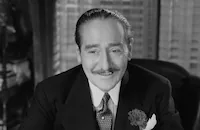
Adolphe Menjou

George Montgomery
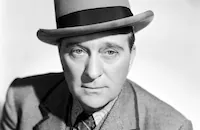
Lynne Overman
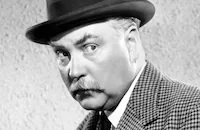
Nigel Bruce

Phil Silvers
Sara Allgood

William Frawley

Spring Byington
Ted North
Helene Reynolds
George Chandler
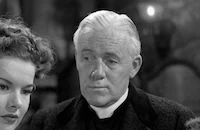
Charles D. Brown
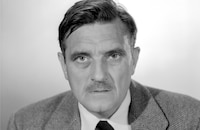
Morris Ankrum
George Lessey

Iris Adrian
Milton Parsons
Billy Wayne
Charles Williams
Leon Belasco
Lee Shumway
Pat O'malley
Phillip Morris
Jim Pierce
Stanley Blystone
Larry Lawson
Harry Carter
Bob Perry

Jeff Corey
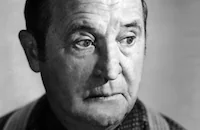
Frank Orth
Alec Craig
Edward Clark
Jack Norton
Leonard Kibrick
Frank Darien
Arthur Aylsworth
Margaret Seddon
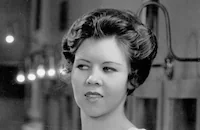
Mary Treen
Crew
Lew Brown
Alfred Bruzlin
James B. Clark
Richard Day
B. G. De Sylva
Fred Fisher
Milt Gross
Roger Heman
Ray Henderson
Wiard B. Ihnen
Nunnally Johnson
Nunnally Johnson
William Koenig
Thomas Little
Alfred Newman
Hermes Pan
Guy Pearce
Ad Schaumer
Leon Shamroy
Gwen Wakeling
Darryl F. Zanuck

Film Details
Technical Specs

Articles
Roxie Hart
Roxie Hart was not the first screen adaptation of Watkins' play; a silent film had been produced in 1927, starring Phyllis Haver. With the censors still ruling what filmmakers could put on the screen, the story had to be toned down for the 1942 Twentieth Century-Fox film. The original play had Roxie as an adulteress and killer, who tried to pin the rap on her husband. Now, director William Wellman and screenwriter Nunnally Johnson had to change the plot so that Roxie couldn't be the killer. Instead, she takes the rap for a murder committed by her husband (George Chandler) because her agent (played by Lynne Overman) tells her it will jumpstart her stage career. During the trial, Roxie is defended by wily lawyer Billy Flynn (Adolphe Menjou), who uses her physical charms to gain the sympathies of both the jury and the press, including reporter Homer Howard (George Montgomery).
The role of Roxie Hart had been intended for Fox's own star Alice Faye, but Faye, who had married radio star and bandleader Phil Harris in 1940, became pregnant with her first child. Ginger Rogers, who had become a top star at RKO in her films with Fred Astaire, had recently renewed her contract, which gave her the right to appear in any film she chose and the right to work for other studios. When Roxie Hart became available at Fox, she took the role. The film was shot on the Fox lot in West Los Angeles from late October to early December 1941, with principal production ending the day before Pearl Harbor, Saturday, December 6th. Retakes were shot on January 2, 1942.
Rogers wrote in her autobiography that although Roxie Hart was not technically a musical, she felt that there needed to be scenes of her tap dancing, since Roxie was a dancer. To choreograph these scenes, she chose her close friend and frequent collaborator, Hermes Pan, who had choreographed her films with Fred Astaire. Rogers wanted her dance numbers to blend in seamlessly, although a scene of her dancing the Charleston was cut from the final film, but can be seen in outtakes. Rogers was particularly fond of a number that she suggested: A moment when Roxie was on a flight of stairs. "I'd always wanted to do taps on a metal staircase, because I knew the taps would have a good, resounding sound. Twentieth Century-Fox didn't have a metal staircase on hand and had to go to a good deal of trouble to locate one. It was finally found in the wreckage from a demolished building in downtown Los Angeles. It was worth the effort; the tap sequence was pure joy to do and, I'm happy to say, a pure joy to watch."
When the film was released on February 20, 1942, the critics were mixed as to how much joy they got from watching Roxie Hart. Variety wrote that "Ginger Rogers does well for a girl who is dazzled by the sudden attention, but seems to overdo her characterization at several points." The often curmudgeonly New York Times critic Bosley Crowther stayed true to form when he complained that "It is simply a ribald wallow in the cheapness of an ugly phase of life. And although Mr. Johnson, the producer as well as the writer of the film, has endeavored to give it an aura of sentiment by telling it in flashback, it still is a trashy story without any immediate pertinence to life." Regardless of what the critics said, Ginger Rogers had the last laugh when she received the 1942 National Board of Review award for her acting in this film and The Major and the Minor.
After Roxie Hart was released, creator Maurine Watkins let the property fade away, shunning offers for remakes or adaptations. Reportedly, she was uncomfortable with the fact that she had glorified murderers. After her death in 1969, legendary stage director Bob Fosse turned the story into the 1975 musical Chicago, starring Gwen Verdon. Verdon had wanted to star in a stage musical version of the story ever since she saw Roxie Hart as a sixteen-year-old. The play was revived in 1996, which led to the 2002 film starring Richard Gere and Renée Zellweger.
SOURCES:
Cahir, Linda Costanzo Literature Into Film: Theory And Practical Approaches
Crowther, Bosley "Roxie Hart, Chicago Remake, with Ginger Rogers, Adolphe Menjou, George Montgomery, See at the Roxy Theatre" New York Times 20 Feb 42
Faris, Jocelyn Ginger Rogers: a Bio-Bibliography
Franceschina, John Hermes Pan: The Man Who Danced with Fred Astaire
Gallafent, Edward Astaire & Rogers
"Ginger Rogers: She Adds New Chapter to Her Success Story" Life 2 Mar 42
Knapp, Raymond The American Musical and the Performance of Personal Identity
Leve, James Kander and Ebb
Rogers, Ginger Ginger: My Story

Roxie Hart
Quotes
Trivia
The role of Roxie was intended for Alice Faye, but she fell pregnant and was unavailable.
The storyline had to be changed in this version in order to placate the Hays Code; both the silent film "Chicago" and the musical "Chicago" are more faithful to the original 1926 play.
Notes
The working titles of this film were Chicago and Chicago Gal. Opening credits include a written statement dedicating the picture to "all the beautiful women in the world who have shot their men full of holes out of pique." Nunnally Johnson's onscreen credit reads: "Produced and Written for the Screen by Nunnally Johnson." According to the Twentieth Century-Fox Records of the Legal Department at the UCLA Arts-Special Collections Library, Walter Catlett was originally signed for the part of "E. Clay Benham." According to letters in the film's file, however, the studio decided to replace Catlett because "the character has now been changed and we are going to use another man." The Twentieth Century-Fox Produced Scripts Collection, also at UCLA, contains notes for a September 4, 1941 conference with executive producer Darryl F. Zanuck, during which Dana Andrews and John Shepperd were considered for the role of "Homer Howard." A Hollywood Reporter news item stated that Thomas Mitchell was cast in the picture, but he does not appear in the finished film and it has not been determined what part he was to play. Ginger Rogers was borrowed from RKO and Lynne Overman was borrowed from Paramount for this production. A December 9, 1941 Hollywood Reporter news item includes Vernon Rickard in the cast but his participation in the completed film has not been confirmed. According to a October 13, 1941 studio press release, Erich von Stroheim, Jr. was to assist director William Wellman, but his contribution to the finished picture has also not been confirmed. A December 29, 1941 Hollywood Reporter news item noted that the picture was going back into production for a new ending. According to the news item, producer Nunnally Johnson "decided on a different tag after seeing the rough cut." Rogers and George Montgomery were to be included in the different ending. It has not been determined what the original ending was.
According to the MPAA/PCA Collection at the AMPAS Library, in early 1941, Columbia was interested in producing a picture based on Maurine Watkins' play Chicago. The PCA advised Columbia that "a picture based on this material would be in violation of the provisions of the Production Code and that we could not approve it." The PCA's objections were based on the nature of the characters and the story throwing "a very discreditable light upon the court process of our country." Studio legal records reveal that Twentieth Century-Fox purchased the film rights from Columbia, Watkins and the estate of producer Sam H. Harris. When the studio sent its July 19, 1941 version of the script, entitled Chicago Gal, to the PCA, the PCA rejected the script because "the story seems to be a travesty on the administration of justice and on the courts in this country which would undoubtedly tend to weaken respect for law and order generally." The PCA objected to the characters, notably "Roxie Hart" and "Billy Flynn," committing perjury and subornation of perjury; the script "condoning, if not glorifying, female murderesses, and of minimizing the seriousness of the crime of homicide"; and wondered "whether this picture will not be considered an attack on American institutions and way of life, and, if so taken, will not inevitably call down condemnation on the whole motion picture industry." Subsequent versions of the script were approved by the PCA, although the studio was repeatedly cautioned not to make the judge and court process in general objects of ridicule.
Maurine Watkins' play was first filmed in 1927 as Chicago by De Mille Pictures. It was directed by Frank Urson and starred Phyllis Haver and Victor Varconi. On June 3, 1975, the musical Chicago, directed and choreographed by Bob Fosse, opened on Broadway. It starred Gwen Verdon, Chita Rivera and Jerry Orbach. In 2002, Miramax Films released a motion picture based on the musical, also entitled Chicago, which was directed by Rob Marshall and starred Renée Zellweger, Catherine Zeta-Jones and Richard Gere.















